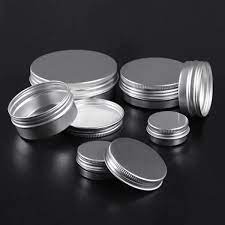Tins: Beyond the Surface - Unearthing the Stories and Significance
This article aims to provide a comprehensive overview of tins, showcasing their historical significance, material diversity, versatile applications, environmental benefits, and cultural importance. Whether used for preservation or as a canvas for creativity, tins continue to be an integral part of our lives.
Exploring the Rich History and Versatility of Tins

Tins, those unassuming metal containers, have played an indispensable role in our lives for centuries. From safeguarding food to housing precious mementos, tins have proven to be versatile vessels with a rich history.
Types of Tins
1. Metal Tins
- Aluminum Tins: Lightweight, corrosion-resistant, and easy to shape, aluminum tins are commonly used for packaging food, cosmetics, and pharmaceuticals.
- Steel Tins: Known for their strength and durability, steel tins are often used for heavy-duty applications like industrial storage and transportation.
2. Decorative Tins
- Collector's Tins: These are typically ornamental tins, often used for commemorative purposes or as collectibles.
- Gift Tins: Designed with intricate patterns or artwork, gift tins are a popular choice for presenting special items like chocolates, cookies, or small gifts.
3. Vintage Tins
- Antique Tins: These are old tins, often from the 19th and early 20th centuries, valued for their historical significance and aesthetic appeal.
- Replica Tins: Newly manufactured tins made in the style of vintage designs, appealing to those seeking a nostalgic touch.
4. Specialized Tins
- Cookie Tins: Specifically designed to store and transport cookies, these tins often come with airtight seals to keep cookies fresh.
- Tea Tins: Known for their airtight seals and light-blocking properties, tea tins are essential for preserving the flavor and aroma of loose-leaf teas.

Common Uses of Tins
1. Food Storage
- Tins are excellent containers for dry foods like cookies, biscuits, and tea, providing an airtight seal to maintain freshness.
2. Packaging
- Many industries use tins for packaging products due to their durability and ability to protect items from moisture, light, and external damage.
3. Crafts and DIY Projects
- Tins can be repurposed for various creative projects such as candle-making, jewelry storage, or even as planters.
4. Collectibles
- Vintage and collector's tins are sought after by enthusiasts for their historical value and unique designs.
Proper Maintenance of Tins
1. Cleaning
- Wash tins with warm soapy water and a non-abrasive sponge. Avoid using harsh chemicals that may damage the finish.
2. Drying
- Ensure tins are completely dry before storing any items to prevent rusting.
3. Avoiding Direct Sunlight
- Prolonged exposure to direct sunlight can cause colors to fade and compromise the integrity of the tin.
4. Avoiding Harsh Chemicals
- Refrain from using abrasive cleaners or chemicals that can corrode or scratch the surface.
5. Preventing Scratches
- Place a protective liner or wrap delicate items before placing them in the tin to prevent scratching.
Sustainability and Recyclability
In an era where sustainability is paramount, tins stand out as an eco-friendly option. Unlike single-use plastics, tins are highly recyclable, with the majority of the world's steel supply being derived from recycled materials. Their durability also means they can be reused for various purposes, reducing the overall environmental footprint.
Cultural Significance
Tins have also etched themselves into cultural history, becoming symbols of traditions and memories. Vintage biscuit tins, for example, evoke nostalgia for many, reminding them of cherished moments spent with loved ones. These cultural artifacts are not just containers but vessels of shared experiences.

some of the most beloved examples of tinned foods and beverages in Nigeria
- Tomato Paste
A cornerstone of Nigerian cuisine, tomato paste is a kitchen essential. Tinned tomato paste serves as the base for numerous dishes, from jollof rice to soups like egusi and obe ata. Its convenience and long shelf life make it a must-have for both home cooks and professional chefs.
- Sardines and Mackerel
Tinned sardines and mackerel are protein-packed treasures commonly found in Nigerian households. These fish varieties are not only delicious but also provide essential nutrients. They are often used to create hearty stews and sauces, adding a distinctive flavor to dishes like efo riro and fisherman's soup.
- Baked Beans
Baked beans, a favorite breakfast accompaniment, have found a special place in Nigerian cuisine. Whether enjoyed on their own, in a sandwich, or as a side dish, tinned baked beans offer a quick and nutritious option for busy mornings.
- Coconut Milk
Tinned coconut milk is a versatile ingredient that adds richness and flavor to a wide range of Nigerian dishes. From coconut rice to coconut-based soups like banga and edikang ikong, this convenient product brings a tropical twist to traditional recipes.
- Evaporated and Condensed Milk
Tinned milk products are essential in both sweet and savory Nigerian cuisine. Evaporated milk is used in tea, porridge, and custards, while condensed milk is a key ingredient in sweets like fudge and toffees. They also find their way into savory dishes like sauces and stews.
- Fruit Juices
Tinned fruit juices offer a convenient way to enjoy a variety of tropical fruits year-round. From guava to pineapple, these juices are used as bases for refreshing drinks and cocktails. They also find their way into desserts and marinades.
- Corned Beef
Tinned corned beef is a versatile protein source that adds depth of flavor to a variety of dishes. It's a key ingredient in meals like corned beef stew and can also be used in sandwiches or as a topping for yam and plantain.
In an age of rapid technological advancement, it's easy to overlook the significance of seemingly mundane items like tins. Yet, these unassuming metal containers have shaped the way we eat, store, and cherish our possessions. From their humble beginnings in preserving food to their modern-day adaptability in various industries, tins continue to be an essential part of our lives.



